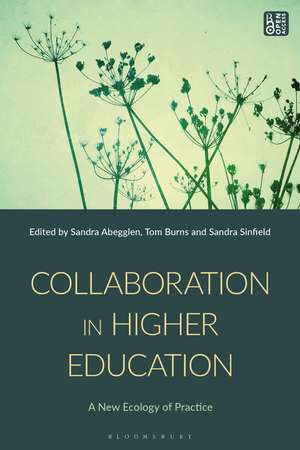Collaboration in Higher Education
Editat de Sandra Abegglen, Tom Burns, Sandra Sinfielden Limba Engleză Hardback – 17 mai 2023
Preț: 540.96 lei
Preț vechi: 774.34 lei
-30% Nou
Puncte Express: 811
Preț estimativ în valută:
103.51€ • 108.37$ • 85.65£
103.51€ • 108.37$ • 85.65£
Carte tipărită la comandă
Livrare economică 05-19 aprilie
Preluare comenzi: 021 569.72.76
Specificații
ISBN-13: 9781350334052
ISBN-10: 1350334057
Pagini: 288
Ilustrații: 20 bw illus
Dimensiuni: 156 x 234 mm
Greutate: 0.58 kg
Editura: Bloomsbury Publishing
Colecția Bloomsbury Academic
Locul publicării:London, United Kingdom
ISBN-10: 1350334057
Pagini: 288
Ilustrații: 20 bw illus
Dimensiuni: 156 x 234 mm
Greutate: 0.58 kg
Editura: Bloomsbury Publishing
Colecția Bloomsbury Academic
Locul publicării:London, United Kingdom
Caracteristici
Written by renowned academics situated in different academic spaces and in different parts of the world capturing different voices and perspectives
Notă biografică
Sandra Abegglen is Researcher in the School of Architecture, Planning and Landscape at the University of Calgary, Canada. Tom Burns is Senior Lecturer in the Centre for Professional and Educational Development at London Metropolitan University, UK. Sandra Sinfield is Senior Lecturer in the Centre for Professional and Educational Development at London Metropolitan University, UK.
Cuprins
Foreword, Gordon Asher (Independent Scholar and Developer, UK) 1. Introduction: Why Collaborate, Sandra Abegglen (University of Calgary, Canada), Tom Burns (London Metropolitan University, UK) and Sandra Sinfield (London Metropolitan University, UK) 2. Choose Your Own Collaboration: An Adventure in Academic Time and Space, Alke Gröppel-Wegener (Staffordshire University, UK), Eleanor Johnston (Staffordshire University, UK) and Lydia Bales (Open University, UK) 3. Staff Collaborations to Enhance Teaching and Learning, Kevin Brazant (London Metropolitan University, UK), Dee Tracey (London Borough of Southwark, UK), Quentin Allan, Robyn McWilliams, Sue Raleigh (Auckland University of Technology, New Zealand), Philippa Soccio, Kate Tregloan (University of Melbourne, Australia), Laura Barclay, Sharon Bittner ,Anne-Kathrin Reck, Rhiannon Parry Thompson (University of Portsmouth, UK), Katherine Herbert, Julia Lynch (Charles Sturt University, Australia), Humayun Murshed (University of New South Wales Global, Australia), Pranit Anand (Queensland University of Technology, Australia), Byron Tsz Kit Lui (UOW College Hong Kong, Hong Kong), Diana J. Pritchard, Helen Connolly, Amanda Egbe, Mohamed Saeudy, Paul Rowinski, James Bishop, Tamara Ashley (University of Bedfordshire, UK) and Nicholas Worsfold (Brunel University London, UK)4. Students as Partners, Anna Maria Jones, Danielle L. Kurtin, Tianshu Liu, Alisia Southwell (Imperial College London, UK), Annamaria Szelics, Sonya Frazier, Holly Kerr, Jack Knowles, Declan Prosser, Lara Ryan, Victoria Paterson, Nicola Veitch, Stewart White (University of Glasgow, UK), Daron Benjamin Loo, Nima Javanbakht, Zhiqing Rong, Xun Wang (National University of Singapore, Singapore), Andrew Struan, Monica Catherine O'Brien, Ewan D. Hannaford (University of Glasgow, UK), Stuart J. Taylor (Edinburgh Napier University, UK), Lynn Wright (Abertay University, Scotland, UK), Max Korbmacher (Western Norway University of Applied Sciences, Norway), Martha Gardiner, Julia Ngadi, Ayesha Shahid and Scott M. Hardie (Abertay University, Scotland, UK) 5. Collaboration With Stakeholders, Gabriella Rodolico (University of Glasgow, UK), Deborah Simpson (UK), Geoff Barrett (Woodlands Primary School, UK), Carol Ainley (Manchester Metropolitan University, UK), Donna Palmer, Rachel Van Krimpen and Susanna Ison (University of Nottingham, UK) 6. Creative and Digital Partnerships, Briony Supple, Siobhán O'Neill (University College Cork, Ireland), Alex Pentek (National Sculpture Factory, Ireland), Guangbo Hao (University College Cork, Ireland), Alina Georgeta Mag (University "Lucian Blaga" of Sibiu, Romania), Jessica Slotte (University of the Arts London, UK), Kiu Sum (University of Westminster, UK), Jennie Blake, Adam Cooke, Jasmine Nisic (University of Manchester, UK) and Karen Arm (Solent University, UK)7. Decolonising Relationships and Partnerships for Social Justice, Ryan Arthur (Birkbeck College, University of London, UK), Nahid Huda (London Metropolitan University, UK), Cybele Atme (Erasmus University Rotterdam, The Netherlands), Pauline Bon (Alumni University of Amsterdam, The Netherlands), Mila de Graaf (University of Amsterdam, The Netherlands), Daniel Haudenschild (University of Kassel, Germany), Mieke Lopes Cardozo, Melina Merdanovic (University of Amsterdam, The Netherlands), Eleonore Nouel (Alumni University of Amsterdam, The Netherlands), Tony Kalume (Diversity Lewes, UK), Jess Moriarty (University of Brighton, UK), Vikki Hill, Louise Taylor (University of the Arts London, UK), Uzma A. Siddiqui (London Metropolitan University, UK), Tess Czerski (University of Amsterdam, The Netherlands) and Jana Finke (Utrecht University, The Netherlands)8. Reflections on Collaboration, Hélène Pulker (The Open University, UK), Chrissi Nerantzi (Manchester Metropolitan University, UK), Emma Gillaspy (University of Central Lancashire, UK), Anna Hunter (University of Law, UK), Ed Bickle (Bournemouth University, UK), Silvina Bishopp-Martin (Canterbury Christ Church University, UK), Paul Chin (University of Bath, UK), Ian Johnson (University of Portsmouth, UK), Ralitsa Kantcheva (Bangor University, UK), Jane Nodder (Northern College of Acupuncture, York, UK), Victoria Rafferty (University of Sunderland, UK), Kiu Sum (University of Westminster, UK), Karen Welton (Plymouth College of Art, UK), Manuela Barczewski, Keith Beckles, Simone Maier (London Metropolitan University, UK), Monika Hrebacková, Martin Stefl, Jana Zverinová (University of Chemistry and Technology Prague, Czech Republic) and Tanja Vesala-Varttala (Haaga-Helia University of Applied Sciences, Finland)Afterword: Collaboration, Community Building and 'Brokering', Debbie Holley (Bournemouth University, UK)Index
Recenzii
I think this is a useful challenge to dominant models of higher education in that it privileges those who work in contrasting modes, in a meaningful way.
Comprehensive, practical case studies makes application much easier.
I believe that this proposal has intellectual merit as a handbook for the various ways collaboration can be expressed in higher education. The topics are wide-ranging and could provide readers with a fresh look at the taken-for-granted concept of collaboration.
Comprehensive, practical case studies makes application much easier.
I believe that this proposal has intellectual merit as a handbook for the various ways collaboration can be expressed in higher education. The topics are wide-ranging and could provide readers with a fresh look at the taken-for-granted concept of collaboration.
